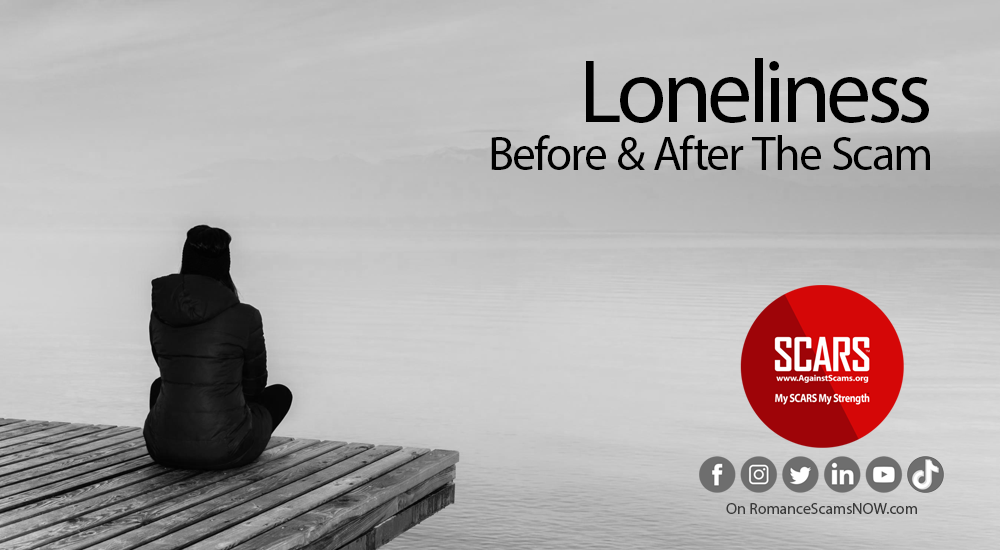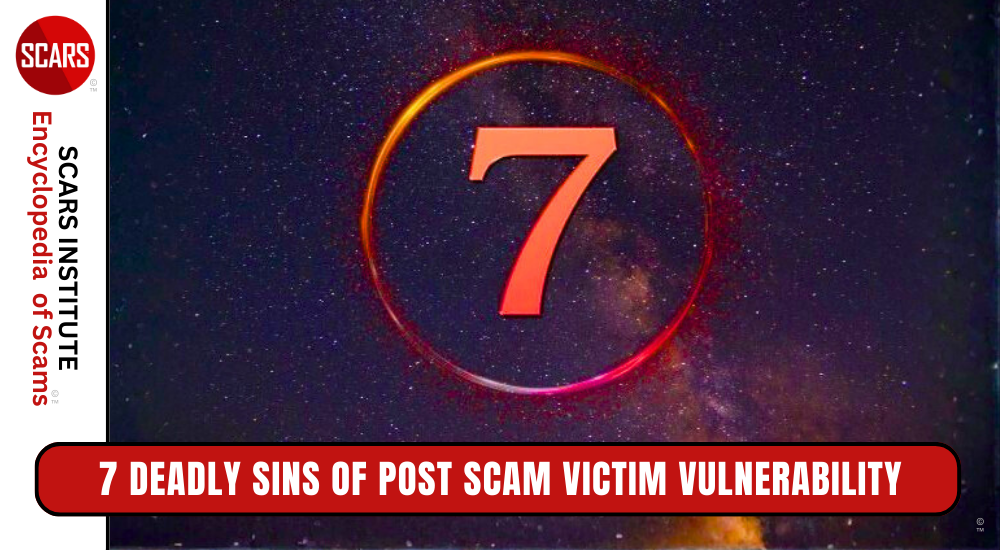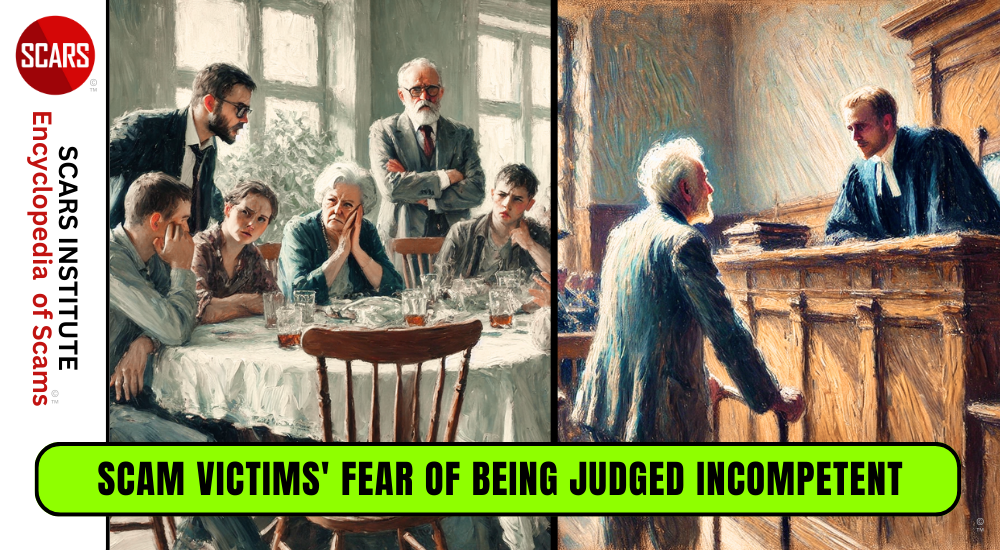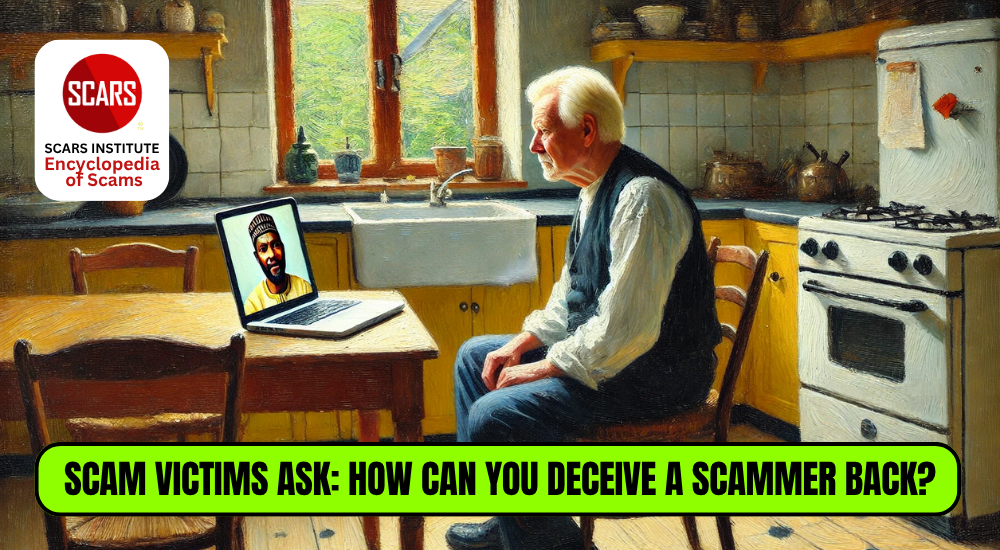
SCARS Institute’s Encyclopedia of Scams™ Published Continuously for 25 Years

Loneliness Can Lead You Into Scams And Prevent You From Recovering
We have noted over the years that many (most) scam victims talk about being vulnerable to a romance scam because they were lonely.
Is This Really True?
Though our need to connect is an essential part of us, many of us frequently feel alone. But alone and loneliness are not the same thing.
Loneliness is the state of distress or discomfort that results when one perceives a gap between one’s desires for social connection and actual experiences of it.
Even people who are surrounded by others throughout the day—or are in a long-lasting relationship—can still experience a deep and pervasive loneliness. Research suggests that loneliness poses serious threats to well-being as well as long-term physical health.
What is Loneliness?
Loneliness is a state of mind characterized by a dissociation between what an individual wants or expects from a relationship (human connection) and what that individual experiences in that relationship or the lack of it. The relationship can be romantic, career, or friendship.
BECAUSE LONELINESS IS A STATE OF MIND, BEING PHYSICALLY ALONE IS NOT A NECESSARY NOR A SUFFICIENT CONDITION TO EXPERIENCE LONELINESS
One can experience a lonely state of mind while being with people at work, at home, or even in a relationship. Income, education, gender, and ethnicity don’t protect you from loneliness, and it is contagious.
One in three people in America, Canada, and Great Briton is affected by loneliness, and one in 12 is affected severely.
The effects of loneliness can’t really be tied to the physical characteristics of lonely people. Rather, they are due to the effects of loneliness on everyday people.
Loneliness is a universal condition that makes a person irritable or angry, self-centered, depressed, insecure and is associated with a 26 percent increase in the odds of premature mortality. According to our evolutionary model of loneliness, loneliness causes more than just mental health and behavioral dysfunction. For instance, studies have also reported a significant association between loneliness and various health issues such as cardiovascular disease, diminished sleep salubrity (quality), increased inflammation, and decreased viral immunity, even after controlling for various other factors.
LONELINESS CAN ALSO INCREASE LONELINESS
Loneliness is typically reversible, but commonsense solutions are not helpful.
First, one must understand the definition of loneliness. Being alone for dinner is not the same as being lonely; one can be physically alone and mentally with someone or part of a community by thinking of them, keeping their family or partners in photographs or having dinner with their people via video chat.
In turn, one may feel extremely lonely while having dinner with an estranged partner or old friend for example.
Finally, one may seek solitude during a holiday and be extremely happy alone (both mentally and physically). Solitude is different from loneliness. But solitude can be a red flag for loneliness.
Identifying and Fighting Loneliness
Whether a person lives in isolation or not, feeling a lack of social connectedness can be painful. Loneliness can be described in different ways; a commonly used measure of loneliness, the UCLA Loneliness Scale, asks individuals about a range of feelings or deficits of connection, including how often they:
- feel they lack companionship
- feel left out
- feel “in tune” with people around them
- feel outgoing and friendly
- feel there are people they can turn to
Given the potential health consequences for those who feel like they have few or no supportive social connections, widespread loneliness poses a major societal challenge. But it underscores the demand for increased outreach and connection on a personal level, too.
This is a major cause for the vulnerability that helps lead a victim into a relationship scam.
Why is it So Hard to Seek Out Companionship (or the Right One) When One Feels Lonely?
There’s evidence that lonely individuals have a sort of negativity-bias in evaluating social interactions – an insecurity – and establish barriers.
Lonely people pick up on signs of potential rejection (real or imagined) more quickly than do others, perhaps better to avoid it and protect themselves or drive others away.
THUS, LONELINESS CAN BE QUITE SELF-DESTRUCTIVE
People who feel lonely need to be aware of this bias or insecurity so as to override it in seeking out the right kind of companionship, particularly in avoiding loneliness traps such as romance scams.
Loneliness, Health, and Well-Being
A number of unfavorable outcomes have been linked to loneliness. In addition to its association with depressive symptoms and other forms of mental illness, loneliness is a risk factor for heart disease, Type 2 diabetes, and arthritis, among other diseases.
One of the major impacts for lonely people is their extremely high risk for scams and fraud. Their loneliness (and associated attributes of insecurity, selfishness, etc.) make them ideal candidates for a fake romance or relationship.
Lonely people are also twice as likely to develop Alzheimer’s disease, research suggests. The state of chronic loneliness may trigger adverse physiological responses such as the increased production of stress hormones, hinder sleep, and result in weakened immunity.
The Best Advice for Someone Who’s Feeling Isolated and Lonely
Introspection, connection, and interaction. These are the keys to overcoming loneliness!
- First, stay connected and make a daily effort to express gratitude – to yourself and others. Selfishness is a common danger in loneliness and it must be fought against – gratitude is the weapon to combat it.
- Next, do something helpful or nice for others (without expecting anything in return). Collaborate with others and work together in harmony. Volunteer to help people in need. Choose to engage with people (including strangers) on different levels and on a broad range of topics, and listen to them.
- Finally, share positive news (rather than negative information) and expect the best from people.
Community
Finding and actively participating in a community of like people is an easy way to begin rebuilding bonds that connect you with others.
After being scammed, victims commonly ask for support, but they really have no idea what that is. Most often it is looking for a savior who can recover their money. Yet, while that is important, though most often impossible, it does not resolve their issues with loneliness. In fact, it is an expression of their lack of interest in resolving loneliness.
Many will find their way into communities of vigilantes and scammer haters, but this serves only to further isolate individuals by only linking them through their shared hate – this is not the basis of community development or deep personal connections.
Fortunately, there are real communities where victims can share and become a part of real communities, that can help fill a gap in their social connectedness. SCARS Support Groups are designed to fill that role.
Regardless of what the community is, scam victims especially need to find a community where they feel at home and can belong. Where they can be open and honest (within limitations, of course), and where they can be trusted and trust others.
EVERY SCAM VICTIM SHOULD FIND SUCH COMMUNITIES
A Warning
However, victims must recognize that they are going through processes of grief and recovering from trauma, and these can create hostile emotional states.
While someone can join and connect through a community, it is important to understand that communities will only accept behaviors that contribute to the group’s harmony and the person’s progress.
Anger especially is an easy way to alienate a community and destroy the opportunity for a victim to fill that void and begin to overcome loneliness.
It is always important to be self-aware and do their best to moderate destructive emotions so that the gains made in a community are not lost by rash actions and behaviors.
Participation
Communities do not function through spectators. They work by active, even if intermittent, participation. Those that sit on the sidelines and just watch will not gain the benefit of the community, and in fact, can enhance or increase their loneliness.
It takes very little effort to step up and be an active part of a community, and the benefits are significant. But make no mistake, communities know who is not participating, and people will naturally pull away from those they see as willfully separate and unwilling to participate.
Final Word
We hope this helps cast a new light on this topic and that you all can benefit.
-/ 30 /-
What do you think about this?
Please share your thoughts in a comment below!
Table of Contents
- The Psychology of Scams
- Is This Really True?
- What is Loneliness?
- Identifying and Fighting Loneliness
- Why is it So Hard to Seek Out Companionship (or the Right One) When One Feels Lonely?
- Loneliness, Health, and Well-Being
- The Best Advice for Someone Who’s Feeling Isolated and Lonely
- Community
- A Warning
- Participation
- Final Word
LEAVE A COMMENT?
Thank you for your comment. You may receive an email to follow up. We never share your data with marketers.
Recent Comments
On Other Articles
- on Reporting Scams & Interacting With The Police – A Scam Victim’s Checklist [VIDEO]: “Yes, this is a scam. For your own sanity, just block them completely.” Feb 25, 15:37
- on Danielle Delaunay/Danielle Genevieve – Stolen Identity/Stolen Photos – Impersonation Victim UPDATED 2024: “She goes by the name of Sanrda John now” Feb 25, 10:26
- on Reporting Scams & Interacting With The Police – A Scam Victim’s Checklist [VIDEO]: “So far I have not been scam out of any money because I was aware not to give the money…” Feb 25, 07:46
- on Love Bombing And How Romance Scam Victims Are Forced To Feel: “I was love bombed to the point that I would do just about anything for the scammer(s). I was told…” Feb 11, 14:24
- on Dani Daniels (Kira Lee Orsag): Another Scammer’s Favorite: “You provide a valuable service! I wish more people knew about it!” Feb 10, 15:05
- on Danielle Delaunay/Danielle Genevieve – Stolen Identity/Stolen Photos – Impersonation Victim UPDATED 2024: “We highly recommend that you simply turn away form the scam and scammers, and focus on the development of a…” Feb 4, 19:47
- on The Art Of Deception: The Fundamental Principals Of Successful Deceptions – 2024: “I experienced many of the deceptive tactics that romance scammers use. I was told various stories of hardship and why…” Feb 4, 15:27
- on Danielle Delaunay/Danielle Genevieve – Stolen Identity/Stolen Photos – Impersonation Victim UPDATED 2024: “Yes, I’m in that exact situation also. “Danielle” has seriously scammed me for 3 years now. “She” (he) doesn’t know…” Feb 4, 14:58
- on An Essay on Justice and Money Recovery – 2026: “you are so right I accidentally clicked on online justice I signed an agreement for 12k upfront but cd only…” Feb 3, 08:16
- on The SCARS Institute Top 50 Celebrity Impersonation Scams – 2025: “Quora has had visits from scammers pretending to be Keanu Reeves and Paul McCartney in 2025 and 2026.” Jan 27, 17:45
ARTICLE META
Important Information for New Scam Victims
- Please visit www.ScamVictimsSupport.org – a SCARS Website for New Scam Victims & Sextortion Victims
- Enroll in FREE SCARS Scam Survivor’s School now at www.SCARSeducation.org
- Please visit www.ScamPsychology.org – to more fully understand the psychological concepts involved in scams and scam victim recovery
If you are looking for local trauma counselors please visit counseling.AgainstScams.org or join SCARS for our counseling/therapy benefit: membership.AgainstScams.org
If you need to speak with someone now, you can dial 988 or find phone numbers for crisis hotlines all around the world here: www.opencounseling.com/suicide-hotlines
A Note About Labeling!
We often use the term ‘scam victim’ in our articles, but this is a convenience to help those searching for information in search engines like Google. It is just a convenience and has no deeper meaning. If you have come through such an experience, YOU are a Survivor! It was not your fault. You are not alone! Axios!
A Question of Trust
At the SCARS Institute, we invite you to do your own research on the topics we speak about and publish, Our team investigates the subject being discussed, especially when it comes to understanding the scam victims-survivors experience. You can do Google searches but in many cases, you will have to wade through scientific papers and studies. However, remember that biases and perspectives matter and influence the outcome. Regardless, we encourage you to explore these topics as thoroughly as you can for your own awareness.
Statement About Victim Blaming
SCARS Institute articles examine different aspects of the scam victim experience, as well as those who may have been secondary victims. This work focuses on understanding victimization through the science of victimology, including common psychological and behavioral responses. The purpose is to help victims and survivors understand why these crimes occurred, reduce shame and self-blame, strengthen recovery programs and victim opportunities, and lower the risk of future victimization.
At times, these discussions may sound uncomfortable, overwhelming, or may be mistaken for blame. They are not. Scam victims are never blamed. Our goal is to explain the mechanisms of deception and the human responses that scammers exploit, and the processes that occur after the scam ends, so victims can better understand what happened to them and why it felt convincing at the time, and what the path looks like going forward.
Articles that address the psychology, neurology, physiology, and other characteristics of scams and the victim experience recognize that all people share cognitive and emotional traits that can be manipulated under the right conditions. These characteristics are not flaws. They are normal human functions that criminals deliberately exploit. Victims typically have little awareness of these mechanisms while a scam is unfolding and a very limited ability to control them. Awareness often comes only after the harm has occurred.
By explaining these processes, these articles help victims make sense of their experiences, understand common post-scam reactions, and identify ways to protect themselves moving forward. This knowledge supports recovery by replacing confusion and self-blame with clarity, context, and self-compassion.
Additional educational material on these topics is available at ScamPsychology.org – ScamsNOW.com and other SCARS Institute websites.
Psychology Disclaimer:
All articles about psychology and the human brain on this website are for information & education only
The information provided in this article is intended for educational and self-help purposes only and should not be construed as a substitute for professional therapy or counseling.
While any self-help techniques outlined herein may be beneficial for scam victims seeking to recover from their experience and move towards recovery, it is important to consult with a qualified mental health professional before initiating any course of action. Each individual’s experience and needs are unique, and what works for one person may not be suitable for another.
Additionally, any approach may not be appropriate for individuals with certain pre-existing mental health conditions or trauma histories. It is advisable to seek guidance from a licensed therapist or counselor who can provide personalized support, guidance, and treatment tailored to your specific needs.
If you are experiencing significant distress or emotional difficulties related to a scam or other traumatic event, please consult your doctor or mental health provider for appropriate care and support.
Also read our SCARS Institute Statement about Professional Care for Scam Victims – click here to go to our ScamsNOW.com website.










![Financial Recovery - Avoid Money Triggers - Perspective on Money for Scam Victims - 2023 [UPDATED 2025] Financial Recovery Money Triggers Financial Recovery - Avoid Money Triggers - Perspective on Money for Scam Victims - 2023 [UPDAYED 2025] - on the SCARS Institute RomanceScamsNOW.com - the Encyclopedia of Scams™](https://romancescamsnow.com/wp-content/uploads/2025/06/Financial-Recovery-Money-Triggers.png)
![Married Scam Victims: Rebuilding Trust in a Marriage Following a Romance Scam - [UPDATED 2025] Married Scam Victims 2025 Married Scam Victims: Rebuilding Trust in a Marriage Following a Romance Scam - [UPDATED 2025] - on the SCARS Institute RomanceScamsNOW.com - the Encyclopedia of Scams™](https://romancescamsnow.com/wp-content/uploads/2021/04/Married-Scam-Victims-2025.png)




I think loneliness was more of a factor with the other romance scams I became involved in – particularly the one that occurred at the beginning of the pandemic in 2020.
My most recent scam was just me saying hello to another player in the Yahtzee with Buddies gaming app. It seemed innocent enough. Unbeknownst to me, it would end up being a romance scam and lead to financial loss.
I can truthfully say that I was not lonely when my scam began. My family life is in a bit of a broil due to us moving over 200 miles away. Where we moved to, the culture is hard to break into. Many of the people here are related in one way or another and have known each other for decades. That seems to be a rural phenomenon. My scam began because I was searching for answers to a medical condition I had been diagnosed with. I was looking for a particular person. The scammers were able to figure that out from profiles visited on Instagram. I have to admit that I was a year ago very angry at the doctors that were treating me. That anger may have led to me being more susceptible. What is inconsistent is that there were two separate attempts to pull me into a scam; one that I resisted. The other I did not, I engaged. I became emotionally compromised in the second attempt. And I lost money. I agree that being lonely and loneliness as discussed in this article are two separate states of being. I also agree that individuals who become victims do not necessarily do so due to loneliness. A need to connect enables the bonding through the euphoric rush of first feelings. All humans need connection. Sometimes family and friends are there to fill the empty space. Sometimes they are not. I agree with this article that approaching our days with a spirit of gratitude can help us see our situations in a more positive view. Helping others will help us feel we are doing something positive about reestablishing connection.
I like how this article differentiated loneliness and being physically alone. I certainly experienced loneliness in my previous marriage, which is why I pursued a divorce.
Loneliness was definitely part of my scam experience and is still a problem for me. This article had some very helpful information and advice that I hope to put to good use.